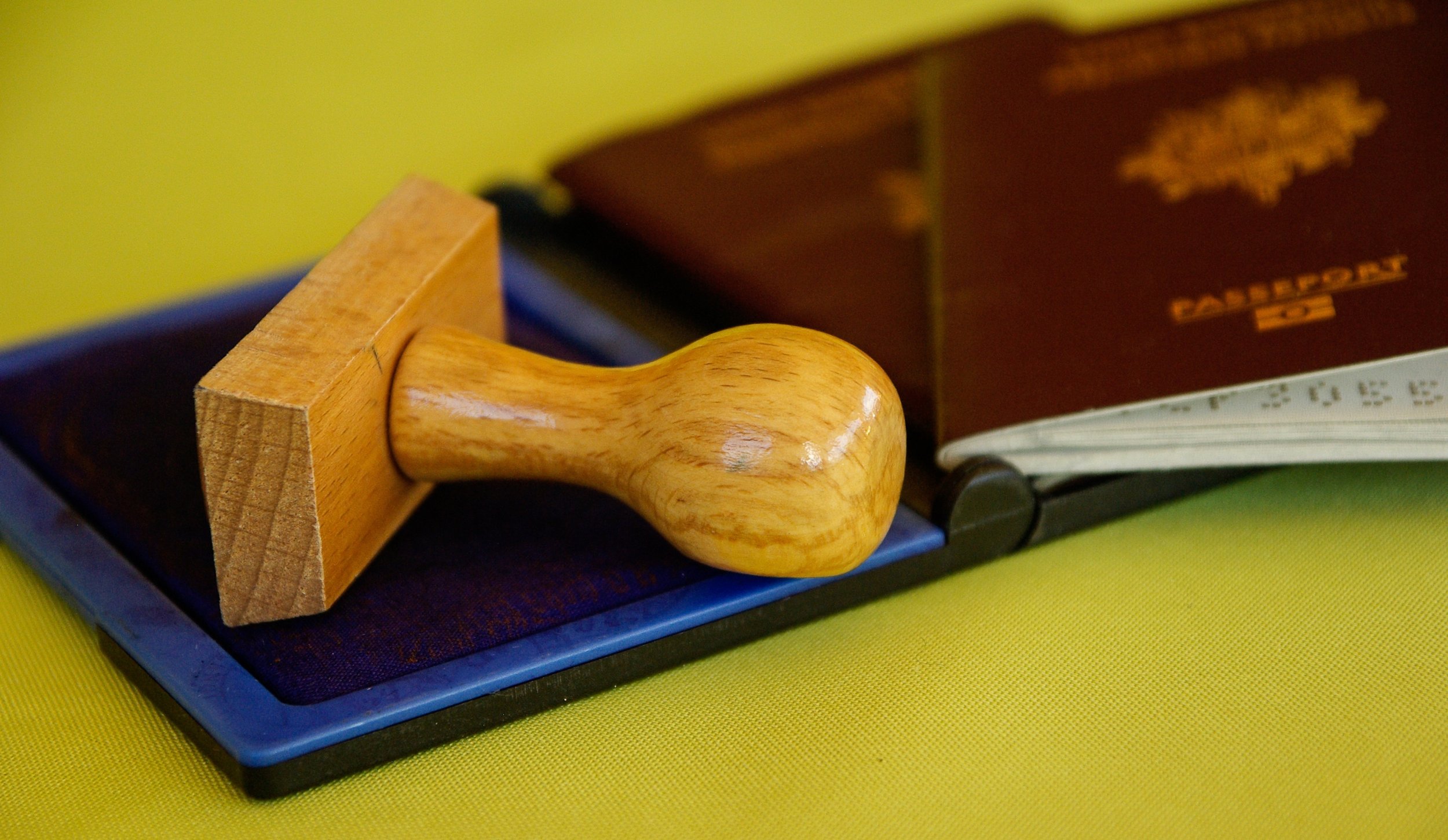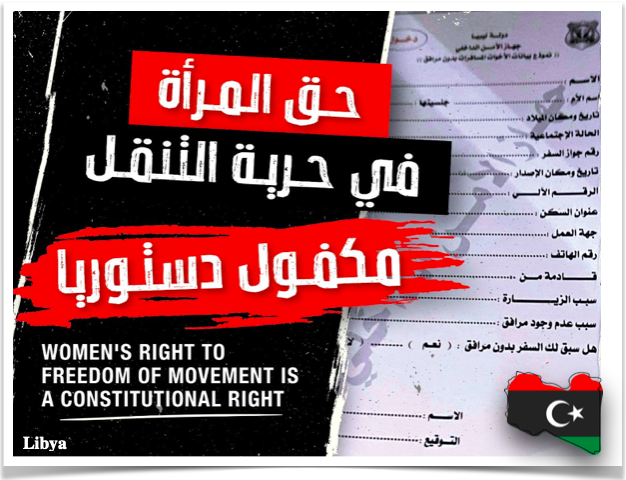Violating women’s right to freedom of movement is an insult to Libyan women and a contravention of the constitution and law
Joint statement on discriminatory measures restricting women’s travel in Libya
Libya, 13 May 2023 We, the undersigned activists and civil society organizations, express our strong condemnation of the discriminatory measures imposed by the Internal Security Agency of Libya’s National Unity Government on women’s freedom of movement.
These discriminatory measures mean that every Libyan woman traveling alone is required to complete an official declaration providing: her reasons for travel, an explanation of why she is traveling alone, and details of her travel history. This procedure constitutes a violation of women’s constitutional right to freedom of movement.
As we look forward to the effective participation of Libyan women in the upcoming national elections, this regressive policy represents policymaking based on discrimination, violence, and persecution against women, reinforcing the dominance and repression of the security system over the country.
This discriminatory measure violates the principle of equality enshrined in the Temporary Constitutional Declaration of 2011 (Article 6, Article 14) and Article 31 of the Political Agreement.
Article (6)
Libyans shall be equal before the law. They shall enjoy equal civil and political rights, shall have the same opportunities, and be subject to the same public duties and obligations, without discrimination due to religion, sect, language, wealth, sex, kinship, political opinions, social status, and tribal, provincial or familial affiliation.
Article (14)
Freedom of opinion for individuals and groups, freedom of scientific research, freedom of communication, liberty of the press, printing, publication and mass media, freedom of movement, freedom of assembly, freedom of demonstration and freedom of peaceful sit-in shall be guaranteed by the State in accordance with the law.
Article (31)
All Libyan, males and females, shall have the right to free movement throughout Libya, and the right
to travel abroad via any of the airports, maritime ports or land crossings. No action shall be taken
with the intention to restrict anyone’s freedom of movement except in accordance with the Libyan
legislations in force and based on the orders of the competent judicial authorities. Libyan Political Agreemen
Grave violation of all international covenants and agreements on human and women’s rights that Libya
It is also in conflict with Libyan legislation that guarantees women’s right to movement and travel as full citizens with all the guarantees of citizenship. Moreover, this measure constitutes a grave violation of all international covenants and agreements on human and women’s rights that Libya has ratified, including the Universal Declaration of Human Rights, the International Covenant on Civil and Political Rights, the Convention on the Elimination of All Forms of Discrimination against Women, the African Charter on Human and Peoples’ Rights, and other binding international standards protecting the rights of “equality, freedom of movement, residence, and travel.”
Article I
For the purposes of the present Convention, the term “discrimination against women” shall mean any distinction, exclusion or restriction made on the basis of sex which has the effect or purpose of impairing or nullifying the recognition, enjoyment or exercise by women, irrespective of their marital status, on a basis of equality of men and women, of human rights and fundamental freedoms in the political, economic, social, cultural, civil or any other field.
Respect women’s rights to non-discrimination
In this context, we signatories condemn the specious arguments put forward by some female members of the House of Representatives in written statements justifying the measures in terms of supposed vulnerability and susceptibility of women to becoming victims of fraud and the exceptional circumstances the country is going through. As the country prepares for an upcoming election under delicate circumstances, there is an urgent need to create suitable conditions for free and fair elections, ensuring the basic rights of all individuals, including the right to freedom of movement, travel, and peaceful assembly. This is to renew political legitimacy, achieve the desired stability, and begin building a state of institutions and the law, based on the rights of citizenship and non-discrimination.
This discriminatory law must be repealed immediately
We demand that the National Unity government immediately repeal this discriminatory decision, which humiliates Libyan women and represents a regression and violation of the basic rights and freedoms guaranteed constitutionally, legally, and internationally, and ensure the adoption of measures that preserve national security and safeguard the dignity of Libyan women.
#WomensRightsAreHumanRights
◤ Signatories:
– The Libyan Women’s Platform for Peace
– Adala for All Association
– Libya Future Center for Media and Culture
– Defender Center for Human Rights
– WASHM Organization
– Nawazi Organization for Gender Studies
– Cairo Institute for Human Rights Studies
– Aman Against Discrimination
– Karama International Organization
– Tafarud Empowerment Organization
– Amazonat Organization
– Solidarity Organization to advocate for Women’s Issues
◤ Individuals:
1. Zahra’ Langhi, Co-founder & CEO of the Libyan Women’s Platform for Peace, member of the Political Dialogue Forum
2. Umm Al-Ezz Al-Farsi, a member of the Political Dialogue Forum, a faculty member at the University of Benghazi
3. Salah Al-Marghani, human rights activist and former Minister of Justice
4. Hassan Al-Amin, editor-in-chief of Libya Al-Mustaqbal
5. Bashir Zoabieh, editor-in-chief of Al-Wasat
6. Amal Al-Obaidi, a university professor
7. Ikram Bash Imam, President of the Libyan Women Engineers Association and former Minister of Tourism
8. Wafia Saif Al-Nasr, member of the Political Dialogue Forum
9. Fayrouz Abd al-Rahim al-Naas, politician and academic
10. Aida Salem Al-Kibti, writer and the first female anchor on Libyan television during the independence period)
11. Razan Naim al-Maghrabi, writer
12. Farida Al-Allaqi, human rights activist and former Libyan ambassador to the European Union
13. Naima Jibril, former head of the Benghazi Court and a member of the Political Dialogue Committee in Skhirat
14. Amina Al-Maghirbi, an academic and former member of the General National Congress (GNC)
15. Ibtisam Bahih, an academic and member of the Constitutional Drafting Assembly
16. Fatima Shanib, a lawyer at the Public Defender’s Department in Benghazi
17. Hala Ahmed Al-Atrash, a faculty member at the Faculty of Law, University of Benghazi
18. Lamia Sharaf Al-Din, a faculty member at the University of Tripoli
19. Fatima Ghandoura, a university professor and media personality
20. Hanan Saad Yaqa, a human rights activist and president of the Tawergha Women’s Union
21. Farida Muhammad Al-Zalitani, a human rights activist
22. Jazia Shaiter, a legal and human rights activist
23. Abeer Amnina, academic and head of WASHM organization
24. Marwa Salem, a feminist activist
25. Ahmed Al-Jahani, an international economist and legal expert, former Minister of Stability in the Executive Office
26. Muhammad Buisir, a politician interested in public affairs
27. Zahi al-Maghirbi, academic
28. Najeeb Al-Hasadi, academic
29. Nujood Langhi, a researcher and human rights activist, founding member at LWPP
30. Enas, Sodouh, a civil activist
31. Israa, a professional researcher
32. Hala Salem Al-Misrati, a human rights activist, Solidarity Organization for the Advocacy of Women’s Issues
33. Tahani Farhat Darbi, a journalist
34. Ali Al-Abani, an artist
35. Khaled Mutawa, a Libyan poet and writer
36. Reem Jibril, an artist
37. Hadia Kana, an artist
38. Ehda Ibrahim Makraz, media activist and faculty member at the University of Benghazi
39. Asmaa Sriba, a former representative of the General National Congress
40. Jamila Falaq, a civil activist and former Minister of Women’s Affairs
41. Mabrouka Al-Mismari, a media activist and a founding member of the Libyan Women’s Platform for Peace
42. Zakia Muhammad al-Ta’eb, a women’s rights activist
43. Hajar Al-Hunaid, a scout leader
44. Asmaa Dikna – a human rights activist
45. Maysoon Saleh, media activist
46. Hind Saleh Al-Bishari, President and founder of Tafarud Empowerment Organization
47. Lam’an Muhammad Buisir, media activist
48. Ayat Amneena, a civil activist
49. Haneen Bouchoucha, a feminist activist
50. Nahla Al-Mahdi Al-Misawi, journalist
51. Khadija Al-Baseikri, a poet and activist in the field of women’s rights
52. Fatima Omar Hawass, a human rights activist
53. Basma Al-Werfalli, a civil activist
54. Mansour Ati, journalist and civil society activist.
55. Khadija Ramadan Al-Amami, a journalist.
56. Iman Ben Younes, a legal expert and former state minister for institutional restructuring
57. Azza Omar Bugendoura, an academic
58. Libya Idris Al-Mismari, media activist
59. Hala Awad Lanqi, an academic
60. Hanan Al-Maqoub, a civil and media activist
61. Amal Al-Dilawi, an entrepreneur
62. Rima Saleh Al-Juraidi, an academic
63. Al-Sharif Al-Wafi Muhammad Ali, former General National Congress (GNC) member and a Presidential Candidate
64. Asaad Mohsin Zhiyu, presidential candidate
65. Fathallah al-Senussi al-Mahdi al-Jadi, writer and diplomat
66. Ahmed Al-Abbar, former member of the National Transitional Council
67. Ahmed Al-Sharkasi, member of the Political Dialogue Forum
68. Malak Al-Hannushi, a civil activist
69. Hana Shalouf, a civil activist and a member of the Peacemakers team
70. Mabrouka Jibril, a civil activist and scout leader
71. Nada Al-Sharif, a member of the scout team and the girls’ team at the Libyan Women’s Platform for Peace
72. Mason Tuger, an economist
73. Wajd Al-Saedi, a civil activist
74. Khalil Al-Hassi, a media activist
75. Hazem Al-Ferjani, Chairman of the Board of Directors of the Barah Cultural Organization
76. Nouran Al-Arabi, human rights activist – Executive Director of the Libyan Debating Club
77. Tazeer Al-Omrani, media activist and human rights activist
78. Hind Al-Hunaid, a civil activist and scout leader
79. Areej Khattab, a faculty member at the University of Al-Bayda
80. Rima Ateeqa, a civil activist
81. Ahmed Wanis al-Makki, writer and political activist
82. Haitham Al-Keeb, former UN/ESCWA advisor
83. Ashour Hamad Burashid, Libyan politician and former Representative of Libya at the League of Arab States
84. Ahmed Mohamed Faraj Amtir, an employee at the Diplomatic Institute / Benghazi
85. Basma Faraj Al-Tawati, a civil activist
86. Thuraya Muhammad Ali, a civil activist
87. Haifa Salem Al-Baili, media personality
88. d. Ali Maasdnah Idriss, a medical doctor and former ambassador
89. Abdul Wahab Qringo, writer and journalist
90. Rabih al-Jiyash, a human rights activist
91. Abdullah Zaqoub, a writer
92. Moatasem Muhammad Dakhil, a civil activist and a member of the Revolutionary Youth Commission
93. Rehab Shanib, poet and civil activist
94. Amani Khattab, faculty member
95. Sabreen Hussein Muhammad, a civil activist
96. Rania Al-Issawi, a civil activist
97. Bushra Atluba, civil activist and trainer
98. Suad Al-Shuwaidi, an artist and civil activist
99. Muhammad al-Majbari, researcher and civil activist
100. Sari Al-Fitouri, head of Tajard Organization for Architecture and Arts
101. Farida Al-Farsi, a civil activist
102. Huda Khashim, writer
103. Nafie Al-Tashani, translator
104. Dalila Al-Zoghbi, human rights activist – Amnesty International
105. Heba Al-Raz, Executive Director of Atfaluna Organization
106. Manal Al-Hamshari, journalist 107. Enas Daou, a feminist activist
108. Sama Al-Boaishi, civil activist, Maken Foundation
109. Alaa Harib, a civil activist
110. Iman Ben Amer, journalist and photographer
111. Maryam Al-Abani, artist
112. Hajar Halab, human rights activist – TALSA Organization
113. Omar El-Haddad, content manager at Alwasat
114. Abdul Hafiz Ghoga, lawyer, former vice president of the National Transitional Council
115. Amina Khairallah Al-Hassih, Chairman of the Board of Directors of the Change Forum
116. Naji Shuaib Al-Obeidi, member of the Faculty of Engineering, University of Benghazi
117. Suad Ibrahim bin Khalifa, civil society activist and trainer at the Libyan Korean Center
118. Mona Abdel Razek Zoghbiyeh, lawyer and parliamentary candidate
119. Marwan Al-Tashani, human rights activist and researcher



